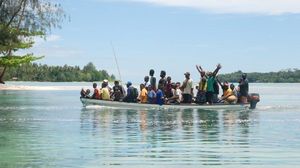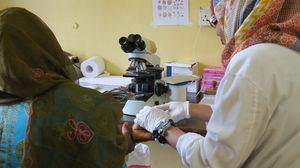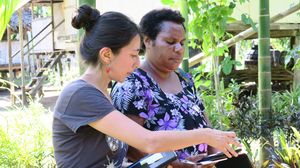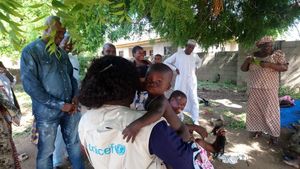Group | Malaria Epidemiology and Control
In the Malaria Epidemiology and Control group, our focus is on generating evidence to support effective malaria control and make best use of limited resources.
Our portfolio includes epidemiological studies to understand the occurrence and determinants of malaria transmission; randomised controlled trials and implementation research to assess the effect of interventions and improve their performance; and large-scale service projects to support malaria control and elimination efforts. We combine fundamental epidemiological methods, such as surveys, longitudinal studies and randomised controlled trials, with qualitative approaches, geospatial analyses, molecular epidemiology, population genetics, modelling and health systems research.
We often evaluate interventions implemented on a large scale as health interventions usually work differently in the real world than in controlled study settings. Our aim is to understand the factors influencing the effectiveness of interventions in specific health system settings in order to contribute to the sustainable, holistic improvement of health programmes.
Currently, our group’s work focuses on vector control strategies, surveillance-response systems, case management, and quality of care.
We work in close partnership with academic institutions across the world, NGOs, international organisations and national malaria control programmes, particularly in Africa and the South Pacific.
At a global level, our group coordinates three key working groups of the RBM Partnership to End Malaria.
Key Projects
Towards Elimination of Malaria in Tanzania

Tanzania has made massive progress in malaria control through innovative approaches rolled-out over the past two decades. To continuously expand and diversify these activities, the TEMT project aims to support cost-effective and evidence-based malaria control efforts at national and decentralized level, enhance multi-sectoral action in malaria control, and develop a knowledge management strategy for malaria control in Tanzania. TEMT builds on the success of its predecessor project NETCELL (Read more about NETCELL) that strengthened the Tanzanian National Malaria Control Programme’s mosquito net campaigns and improved access to timely appropriate diagnosis and treatment of malaria. Read more about TEMT
The GlobMal Project

Through the GlobMal project, Swiss TPH helps to strengthen the RBM Partnership to End Malaria by coordinating three of the Partnership’s working groups (Vector Control WG, Case Management WG, and Multi-sectoral WG). GlobMal also builds essential capacity among upcoming leaders in the field of malaria control through a range of training courses offered to participants from malaria-endemic countries and co-led by experts from around the world. The project is supported by SDC and is currently in its fourth phase. Read more about GlobMal
Malaria Control and Elimination in the South Pacific

Island nations in Melanesia exhibit a diverse malaria epidemiology ranging from high transmission comparable to sub-Saharan Africa in parts of Papua New Guinea to near-elimination situations in Vanuatu or the Solomon Islands. To accelerate progress towards elimination in the region, national malaria control programmes require evidence on appropriate intervention strategies and suitable data systems for targeting interventions. We provide technical and scientific support to the national malaria control programme of Papua New Guinea and conduct operational research and desk-based analyses to inform evidence-based decision-making across the region. Read more about our malaria research in Papua New Guinea
Surveillance-Response

Surveillance has been recognized by the World Health Organization as a core intervention of malaria control and elimination programmes. An effective surveillance-response system aims to detect and classify cases, prevent outbreaks, and provide data to target interventions. We work with malaria control programmes in Zanzibar and Papua New Guinea to assess the effectiveness of existing surveillance-response systems and validate new and innovative approaches. Watch here how visualizing malaria case numbers may be useful to target malaria control in Papua New Guinea and read more about the RADZEC Project in Zanzibar.
Residual Malaria Transmission

Despite high coverage of existing interventions such as long-lasting insecticidal mosquito nets and treatment with artemisinin-based combination therapy, malaria transmission continues in many places because interventions fail to completely prevent human-mosquito contact. In Papua New Guinea and Tanzania we investigate the drivers of residual malaria transmission with a particular focus on the behaviour of the human host and of the mosquito vector. This way, we aim to identify how traditional and new interventions may be improved to close the existing effectiveness gaps. Read more about our residual transmission project in Papua New Guinea
Severe Malaria

Despite the existence of efficacious medicines, half a million malaria deaths occur every year in children in sub-Saharan Africa. A key challenge is access to appropriate severe malaria treatment from hospitals that are often difficult to reach. In the CARAMAL project, we worked with partners in DR Congo, Nigeria and Uganda to assess the effect of pre-referral rectal artesunate provided at community level to children with severe malaria. The project documented the complexity of severe malaria case management in remote African villages and identified health system shortfalls that prevented rectal artesunate from fulfilling its potential. Read more about the CARAMAL project
Partners and Collaborators
- Kilimanjaro Christian Medical University College
- RBM Partnership to End Malaria
- The Global Fund to fight AIDS, TB and Malaria
- Lao P.D.R. Health Research Portal
- Ministry of Health Zanzibar
- Ministry of Health, Tanzania
- Centers for Disease Control and Prevention
- Population Services International

 Duha Abuobaida Abdalla Mahgoub
Duha Abuobaida Abdalla Mahgoub
 Bakar Fakih
Bakar Fakih
 Noela Kisoka
Noela Kisoka
 Christian Lengeler
Christian Lengeler
 Vincent Minconetti
Vincent Minconetti
 Sung Hea Park
Sung Hea Park
 Gabriel Ponce de Leon
Gabriel Ponce de Leon
 Natacha Protopopoff
Natacha Protopopoff
 Osama Seidahmed
Osama Seidahmed
 Aita Signorell
Aita Signorell
 Johanna Stenstrom
Johanna Stenstrom
 Diana Timbi
Diana Timbi